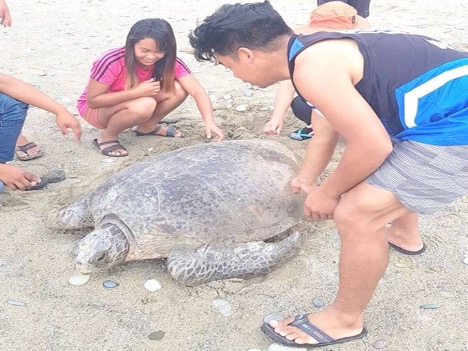BY LEANDER C. DOMINGO
BAYOMBONG, Nueva Vizcaya (June 25)—A mother sea turtle has been successfully returned to the Pacific Ocean after it was rescued in Barangay Ditawini, Dinalungan in Aurora province by local tourists from the upland town of Ambaguio in this province.

Nuepe Manuel Jr., municipal tourism officer of Ambaguio town, said they were at a resort in Dinalungan town in Aurora with some paraglider pilots from Nueva Vizcaya when they saw a turtle that had just laid eggs under a tree.
Manuel said he did not immediately post the photos and videos they took on social media until Tuesday, June 21, after some residents in the area became interested in the eggs when they heard that they helped the turtle return to the sea.
Other than Manuel’s group, only the caretaker of the resort knows the place where the turtle laid its eggs.
Manuel’s group spotted the turtle and immediately worked to help the reptile find its way to the sea for fear that the residents might see it.
“This mother turtle just laid eggs on the shore, and we immediately guided and even pushed her way back to the ocean to prevent it from being captured by locals,” Manuel said.
He said residents who learned about this expressed dismay at failing to catch the turtle because they believe that eating turtle meat and eggs can cure some diseases.
Although the caretaker of the resort promised that he would keep an eye on the turtle eggs, the guests were still worried about the condition of the eggs.
“In the landlocked province of Nueva Vizcaya, we are hundreds of kilometers away from the ocean but we are aware that the turtle is considered endangered and we know that our government is doing so much effort to help save endangered species,” he said.
Endangered species such as turtles are protected under Republic Act 9147, better known as the “Wildlife Resources Conservation and Protection Act.”
The law provides that anyone found to be involved in the capture, assault, killing, sale, or purchase of endangered species will be subject to appropriate penalties such as imprisonment.
“We were excited and even told about the turtle to an elderly woman selling halo-halo and learned that the locals truly hunt turtles whose meat the woman said tastes like beef,” Manuel said.
He said he lied when he was asked where the turtle laid its eggs, especially when he heard that its meat and eggs are also hunted for human consumption and believed to have medicinal value.
“We were happy to have seen through this mother turtle’s tough journey back home to the ocean after laying eggs on the shore. We believe we prevented it from being captured by poachers who could have easily taken it,” Manuel said.
He said he is hoping that nobody finds the eggs until they hatch and that all the hatchlings eventually find their way home to the ocean alive, like their mother.
